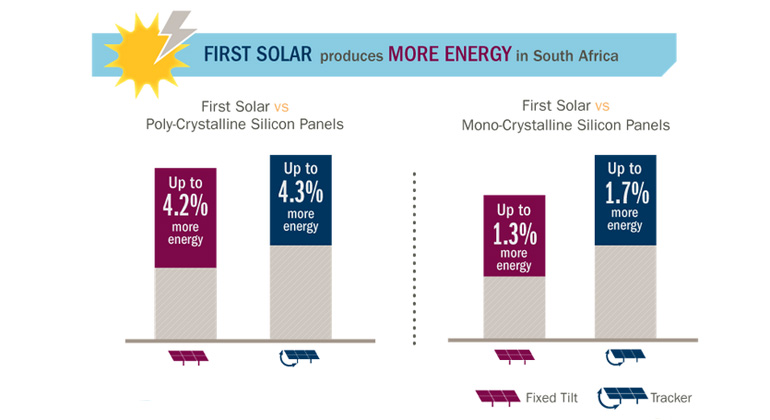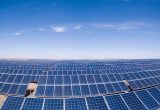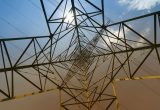Study: First Solar Modules Offer Over 4% More Energy than Silicon PV in South Africa
Independent research into the performance of four solar photovoltaic (PV) module technologies in South Africa, has confirmed that First Solar’s (Nasdaq: FSLR) advanced modules can offer over 4 percent more energy than conventional silicon PV panels.
The study was conducted by Arup, an independent engineering consultancy, and was commissioned by First Solar. It examined the performance of First Solar’s thin film modules and panels from top tier poly- and mono-crystalline silicon PV module manufacturers, in a utility-scale setting at three sites in South Africa. The consulting firm used sophisticated modelling techniques to examine the projected energy yield of the four module types in three hypothetical solar PV plants, with a capacity of about 84 megawatts (MW)DC each, in Bloemfontein, Upington, and Vryburg.
Engineers from Arup conducted 24 energy yield simulations, using plant design parameters that were kept constant across all technologies, and examined the energy yield probability for the first year of production, for each module type. The analysis factored in site-specific meteorological data, which included temperature, irradiance and other weather data. This industry-standard approach ensured that the hypothetical plants closely represented actual onsite conditions based on a typical meteorological year.
The analysis clearly demonstrated that, in South Africa, First Solar’s advanced modules can deliver more energy per year than poly-crystalline silicon panels and mono-crystalline silicon panels in both a fixed-tilt configuration and with the use of trackers. The report revealed that, at the three hypothetical sites:
- First Solar modules offered a 1.3 percent energy yield advantage over mono-crystalline silicon technology and as much as 4.2 percent more energy that poly-crystalline silicon panels, in a fixed-tilt configuration.
- Using single-axis trackers allowed First Solar’s modules to deliver 1.7 percent more energy than mono- crystalline silicon technology and 4.3 percent more than poly-crystalline panels.
“This research is particularly important in light of the highly competitive tariffs that we’re seeing in South Africa’s Renewable Energy Independent Power Producer Procurement Programme. It’s clear that every kilowatt-hour of energy is important and that selecting the right technology for a utility-scale PV Power Plant can add a significant financial upside to the project value,” said Justin Wimbush, Renewable Energy Business Leader at Arup Southern Africa.
First Solar’s advanced thin film PV modules have set the industry benchmark with over 10,000MW installed worldwide. Offering highly predictable energy in all climates and applications, the modules have been independently tested to pass accelerated life and stress tests beyond industry standards. Offering both, a superior temperature coefficient and superior spectral response, they have been independently certified for reliable performance in high temperature, high humidity, extreme desert and coastal environments.
“The results of this extensive analysis validate the suitability and superiority of our module technology in real-world conditions, here in South Africa. It also makes the case for the solar industry to move away from legacy metrics, such as nameplate capacity, and to focus on what truly matters, which is energy,” said Nasim Khan, Vice President for First Solar in Africa. “It is evident that not all PV technologies were created equal and that, in the same configuration, 1MW of First Solar modules will yield more energy than 1MW of crystalline silicon-based modules in actual operating conditions, due to an inescapable fact of semiconductor physics. We hope that this effect will be considered in the energy predictions and financial models used in the development and evaluation process of new solar power plants in South Africa.”
The report can be downloaded from www.firstsolar.com







